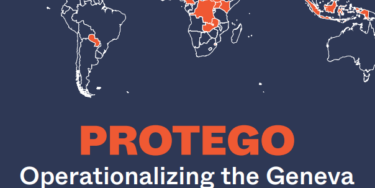This report published by the Danish Institute for Human Rights assesses the policy direction Independent Permanent Human Rights Commission set up by the Organisation of Islamic Cooperation.
First, the author provides a brief history of the IPHRC. Second, he discusses four reasons that indicate that the IPHRC is moving in the wrong direction: its shift away from universalism, its tendency to present biased human rights coverage, its lack of grounding in human rights discourse, and the absence of collaboration with international human rights organizations. Third, he presents recommendations, prepared by a group of human rights experts, that outline ways for the IPHRC to fulfill its mandate to protect and promote human rights in the Muslim world.
In 1990, the OIC introduced the Cairo Declaration on Human Rights in Islam, presenting a set of Islamically defined human rights which conflict with essential principles of the UN Declaration on Human Rights. More recently, the OIC has become known for its promotion of the so-called defamation of religion agenda, challenging the right to freedom of expression. Western states argued that religious people have a right to protection from discrimination and defamation—but religions do not.
However, there are signs of the OIC moving towards a universal conception of human rights, strengthening its participation in the international human rights system. As part of a larger reform of the OIC, a Ten Year Programme of Action was launched in 2005, introducing a clear focus on universal human rights and the importance of mainstreaming them into all programmes and activities.
In 2011, a human rights commission was established with the purpose to support member states in their implementation of international human rights obligations. And the same year, the OIC co-sponsored a UN resolution on religious discrimination, at least on the surface signaling a move away from the anti-defamation agenda.
Optimists see these initiatives as signs of the OIC’s willingness to leave behind the Cairo Declaration, and instead promote a conception of rights that is more in line with international human rights. Skeptics see them as nothing but window-dressing.
These issues were on the agenda at a workshop on the OIC and human rights in September 2013 hosted by the Danish Institute for Human Rights and the ISA Joint Human Rights Conference in Istanbul in June 2014. Some of the papers, including this one written by Turan Kayaoglu, presented at the workshop and the ISA conference are now being published in the Danish Institute for Human Rights’ working paper series Matters of Concern.
Table of Contents
PREFACE 4
INTRODUCTION 7
1 THE INDEPENDENT PERMANENT HUMAN RIGHTS COMMISSION 9
2 FOUR SIGNS THAT IPHR IS WRONG-HEADED 12
2.1 From Universal Rights to Particularities of Islam and Muslim Societies 12
2.2 Problematic Coverage of Human Right Issues 16
2.3 IPHRC discourse is largely devoid of international human rights 17
2.4 The IPHRC’s Institutional Connections are Governmental—not International or Civil Society 18
3 A BETTER PATH FOR THE IPHRC 20
CONCLUSION 24
Download PDF


